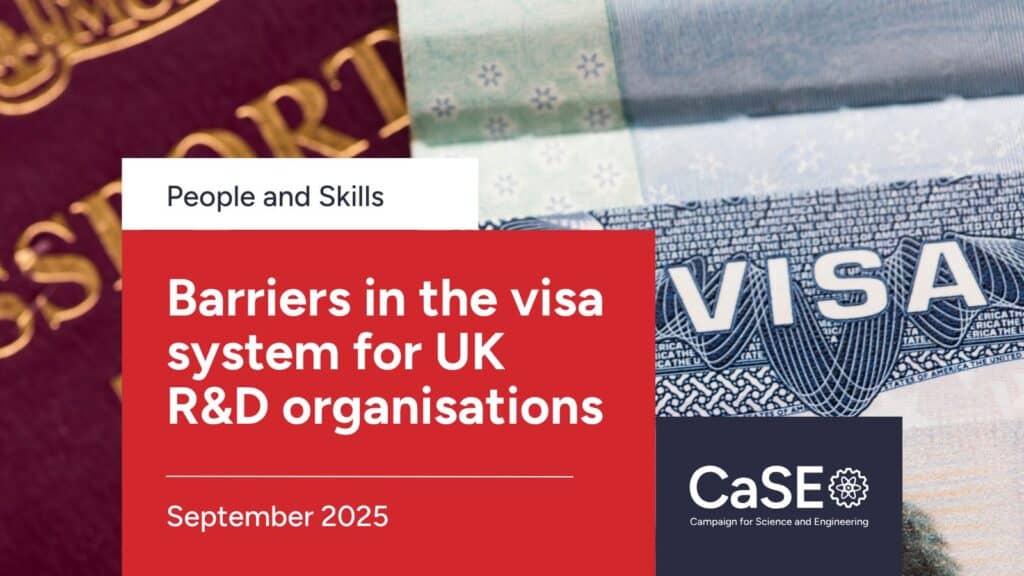What does the post-16 skills white paper mean for research?
Daniel Rathbone
Deputy Executive Director
23 Oct 2025
In the white paper, there was a welcome acknowledgement of the importance of higher education institutions to the UK economy and research, similar to what we set out in our briefing on universities. The white paper recognises the contribution of the sector across many priorities, including supporting the UK’s international standing, providing national capability and delivering regional impact.
There is also a detailed analysis of the financial problems higher education institutions face. This includes the increasing reliance on income from international students, and that the cross-subsidy required to fund domestic teaching and research within the sector has grown. It is important that the Government has a deep understanding of these problems, so that appropriate solutions can be implemented. This understanding has been helped by the clear involvement in the white paper from the Department of Science, Innovation and Technology. The white paper also sets out the Government’s objectives for the higher education system – that it should drive economic growth, deliver a world-leading experience, provide national capability, deliver regional impact and increase the UK’s international standing.
While skills and education are devolved, the white paper also contains proposals on research funding through UKRI, which is not. This does have the potential to cause issues in the devolved nations if research funding is used to drive policy change in England’s higher education institutions that could be inconsistent with the devolved Governments’ objectives for their institutions.

People and Skills
We work with our members and the R&D community to develop policy recommendations that will help ensure the UK has a diverse and talented skills base to meet the requirements of an R&D-intensive economy. This includes work on further and higher education, diversity, and immigration.
ExploreUniversity financial sustainability
Universities will welcome the decision to increase tuition fees with inflation over the next two years, and to legislate to make fee inflationary increases automatic beyond this, subject to meeting teaching quality standards. However, it is not clear how high quality will be defined and measured by the Office for Students (OfS). There is also a risk that new requirements for high quality could add new processes that further contribute to the bureaucratic burden faced by universities.
A less welcome inclusion is that the Government is intent on implementing a levy on international student fees. It is positive that the Government wants to support greater access to higher education, including for people from disadvantaged backgrounds. However, a levy, which could end up costing universities more than they gain in income from tuition fee increases, is not the way to do this. Reduced income for universities will mean less is available to invest in high-cost teaching facilities, in research and in work to underpin local communities and economic growth. Given the significant consequences a levy could have in our recent budget submission we said the Government must take the time needed to consult widely with the R&D sector and to consider the impact of a levy on research. If a levy is introduced, any impact on research must be mitigated through a wider financial settlement to enable universities to continue to deliver the research and innovation the country needs.
On research
The white paper states that the Government’s aim is to “strengthen the sustainability and strategic impact of public research and development investment” by ensuring funding meets three priorities:
“protecting and promoting curiosity-driven research; supporting the delivery of government priorities, missions and the Industrial Strategy; and providing targeted innovation, commercialisation and scale-up support to drive growth.”
The Government wants institutions to specialise in areas of strength in a more collaborative environment; however, the white paper also talks about the importance of diversity and breadth in the research base, something CaSE members also see as a strength and which contributes to national capability. It’s not clear how these two aims will be reconciled if decisions about how and where to specialise are left to individual institutions. There is a risk of a reduction in the diversity and breadth of the research base if decisions are uncoordinated.
Furthermore, among the academic workforce morale is low after rounds of job losses and job insecurity. Despite the positive words about specialisation, collaboration, and consolidation in the white paper, there is a risk that it is perceived as continued cover for cutbacks if it is not done in a considered and strategic way, in consultation with the sector and staff.
The white paper also recognised the importance of quality-related research funding (QR) and the dual support system, which is very welcome, with a commitment to look at increasing the rate of cost recovery for research funding. Focus will now move to UKRI to see how these proposals could be put into practice.
International competitiveness
The white paper recognises the role of the Higher Education sector in driving the UK’s international competitiveness. It provides good signals on the value of international research talent and students to the UK economy and soft power, and commits to working “with the sector to maintain a welcoming environment for high-quality international students.” It reiterates welcome measures that have recently been launched to attract international talent, such as the £54 million Global Talent Fund to attract world-class researchers and their teams to the UK.
However, despite these welcome intentions and positive developments, visa and immigration policy continues to pose barriers to attracting international talent and students to the UK. In particular, the scale and pace of change means that it is difficult for organisations to stay compliant. In our recent submission to the 2025 Autumn Budget, we outlined a range of specific barriers that R&D organisations face when navigating the visa and immigration system. For the UK and the Higher Education sector to remain competitive, it is necessary to address unnecessary barriers to attracting international talent.
Overall picture
It is good that the Government has acknowledged the problems with financial sustainability in the higher education sector and understand that teaching and research are closely linked with lots of cross-subsidies in the system. The white paper sets a general direction the Government wants to see with more detail on solutions and changes to come. For now, the only extra money for the sector comes from increasing tuition fees with inflation, and the Government is continuing with plans for the international student levy which could have a very serious impact.
Related resources

Recent work by CaSE shows how supportive voices can talk about immigration for the UK R&D sector in a way that resonates with the public.

In this briefing CaSE has collated insights from 15 research organisations demonstrating the barriers they face in the UK visa system.

CaSE has taken a look at what the latest numbers of students taking A-levels, GCSEs, Scottish Highers and Advanced Highers in STEM-related subjects means for ongoing trends in STEM education.

Now that Parliament has finished for the summer, here is an ‘end-of-term’ round-up of all recent CaSE analysis of Government’s plans.